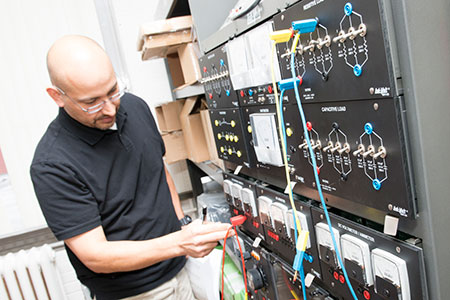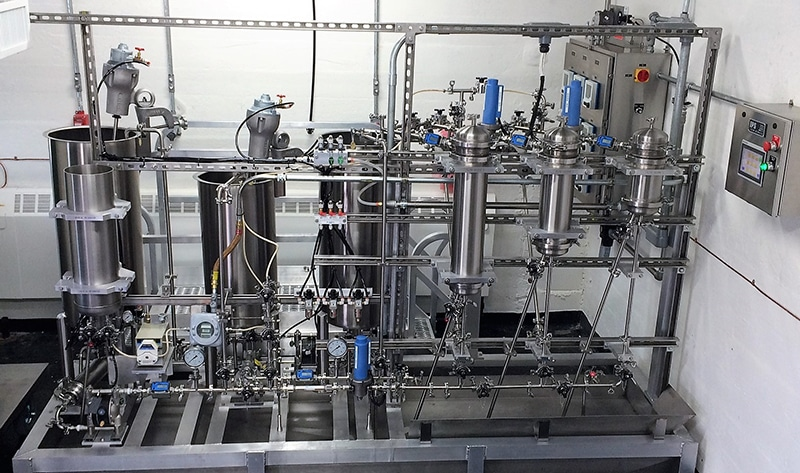Maintenance protocols for lab electrical systems

The Crucial Role of Electrical Systems in Laboratory Operations

The scientific landscape is built upon the foundation of meticulous experimentation and data-driven discoveries. Laboratories, the heart of this endeavor, are intricate environments teeming with sophisticated instruments, delicate samples, and highly trained personnel. At the core of this intricate ecosystem lies a critical element often overlooked: electrical systems. These systems are the invisible backbone that powers the very essence of scientific progress.
From the hum of centrifuges to the glow of microscopes, every piece of equipment in a laboratory relies on a reliable and safe electrical infrastructure. The intricate network of wiring, circuits, and power sources ensures the smooth operation of instruments, the preservation of samples, and the safety of researchers. A malfunctioning electrical system can disrupt experiments, compromise data integrity, and even pose a serious threat to the well-being of lab personnel.
The importance of robust electrical systems in laboratories cannot be overstated. They are the lifeblood of scientific research, enabling the precise control of experiments, the accurate analysis of data, and the advancement of knowledge. However, the complexity of modern laboratory equipment and the ever-increasing demand for sophisticated instrumentation have placed a greater burden on electrical systems. This has led to a growing need for comprehensive maintenance protocols that ensure the reliability, safety, and longevity of these critical systems.
The consequences of neglecting electrical system maintenance can be far-reaching. A faulty circuit could lead to equipment failure, jeopardizing valuable experiments and delaying research progress. A poorly grounded system could create a fire hazard, putting the safety of lab personnel at risk. And a lack of regular inspections could result in hidden electrical problems that escalate into costly repairs or even catastrophic events.
In today's scientific landscape, where research is driven by innovation and precision, the reliability and safety of laboratory electrical systems are paramount. This article delves into the critical aspects of electrical system maintenance, providing a comprehensive guide for lab technicians, project managers, procurement managers, and C-suite executives in the scientific industry. By understanding the importance of proactive maintenance, implementing best practices, and adhering to industry standards, laboratories can ensure the smooth operation of their electrical systems, safeguarding their research endeavors and the well-being of their personnel.
Ensuring Lab Safety and Efficiency: A Recap

The heart of any laboratory, regardless of its size or specialization, beats with the rhythm of its electrical systems. These systems power the instruments, equipment, and technologies that drive scientific discovery and innovation. However, their complexity and the critical role they play in lab operations demand a meticulous approach to maintenance. This article has delved into the intricacies of establishing robust maintenance protocols for lab electrical systems, highlighting the importance of proactive measures to prevent downtime, ensure safety, and optimize performance.
We've explored the critical elements of a comprehensive maintenance program, emphasizing the need for a well-defined schedule, thorough documentation, and a skilled team of technicians. Regular inspections, preventative maintenance, and prompt repairs are essential to identify and address potential issues before they escalate into major problems. This proactive approach not only safeguards the integrity of the electrical systems but also minimizes the risk of accidents, equipment damage, and costly disruptions to research activities.
The article has also emphasized the importance of adhering to safety regulations and best practices. From proper grounding and wiring to the use of appropriate safety equipment, every aspect of electrical work in a laboratory must be conducted with the utmost care and attention to detail. By prioritizing safety, we create a secure environment for researchers, technicians, and everyone who works within the lab.
Beyond the technical aspects, we've underscored the importance of communication and collaboration. Open lines of communication between lab personnel, maintenance teams, and management are crucial for ensuring that everyone is aware of potential issues, maintenance schedules, and any necessary safety protocols. This collaborative approach fosters a culture of safety and efficiency, promoting a seamless flow of research activities.
The Path Forward: Implementing Effective Maintenance
The journey towards optimal lab electrical system maintenance is not a one-time event but an ongoing process. It requires a commitment to continuous improvement, a willingness to adapt to evolving technologies, and a proactive approach to identifying and addressing potential issues. By implementing the principles outlined in this article, laboratories can significantly enhance the reliability, safety, and efficiency of their electrical systems, paving the way for groundbreaking scientific advancements.
Remember, the success of any maintenance program hinges on the dedication and expertise of the individuals involved. Invest in training your technicians, empower them with the knowledge and tools they need to perform their duties effectively, and foster a culture of continuous learning. By nurturing a team of skilled and motivated professionals, you can ensure that your lab's electrical systems are in capable hands.
Beyond the Basics: A Deeper Dive into Electrical Systems
While this article has provided a comprehensive overview of maintenance protocols for lab electrical systems, the world of electrical engineering is vast and ever-evolving. To further enhance your understanding and expertise, we encourage you to explore additional resources and delve deeper into specific aspects of electrical systems relevant to your laboratory's needs.
Consider researching topics such as:
- Advanced troubleshooting techniques for common electrical issues in laboratories
- Best practices for managing electrical loads and preventing overloads
- The latest advancements in electrical safety technologies and their applications in laboratory settings
- The role of data analytics in optimizing electrical system performance and identifying potential problems
By continuously expanding your knowledge and staying abreast of industry best practices, you can ensure that your lab's electrical systems remain reliable, safe, and efficient, supporting your research endeavors and driving scientific progress.
IT Tech: Your Partner in Lab Electrical System Excellence
At IT Tech, we understand the critical role that reliable electrical systems play in the success of your laboratory. We offer a comprehensive range of lab consumables and equipment, including specialized electrical components and systems designed to meet the unique demands of scientific research.
Our team of experts is dedicated to providing you with the highest quality products and services, backed by exceptional customer support. We are committed to helping you build a robust and efficient electrical infrastructure that supports your research goals and ensures the safety of your team.
To learn more about our products and services, or to discuss your specific electrical system needs, please contact us today. We are here to help you achieve electrical system excellence in your laboratory.
In addition to our comprehensive product offerings, we also offer a range of resources and support services to help you optimize your lab's electrical systems. These resources include:
- Technical documentation and guides
- Expert consultations and troubleshooting support
- Training programs for lab technicians and personnel
- Customized solutions tailored to your specific needs
We believe that a strong partnership between IT Tech and our customers is essential for achieving optimal lab electrical system performance. We are committed to working closely with you to understand your unique requirements and provide the solutions you need to succeed.
To further enhance your understanding of lab electrical systems and ensure you have the right equipment for your specific needs, IT Tech offers a comprehensive bouquet of services and products tailored to meet the demands of modern laboratories.
Our range of services includes:
- Electrical System Assessment: Gain valuable insights into your lab's electrical infrastructure through our expert assessment services. We'll analyze your system's efficiency, safety, and reliability to provide actionable recommendations.
- Product Recommendations: Rely on our expertise to recommend the most suitable electrical products for your lab. From power distribution units to surge protectors, we'll ensure you have the right tools for the job.
- Installation and Maintenance: IT Tech offers professional installation services to ensure seamless integration of electrical equipment into your lab environment. Additionally, we provide ongoing maintenance to keep your systems operating at peak performance.
- Training and Support: Empower your staff with our training programs designed to enhance their understanding of lab electrical systems. Our support team is also available to address any queries or concerns you may have.
Invest in the right equipment, implement robust maintenance protocols, and partner with IT Tech to achieve electrical system excellence and drive scientific progress.
Contact us today to submit an enquiry and discover how IT Tech can elevate your laboratory's electrical infrastructure.
Products You may Like
Check out other IT- Tech product that suit your taste
Subscribe to our newsletter
Stay updated with IT-Tech Insights
Related posts
Check out other IT- Tech Scientific Resources

HVAC considerations by lab type
Maintaining a controlled environment is critical for the success of any laboratory. HVAC systems play a vital role in ensuring optimal temperature, humidity, and air quality, which directly impact experimental results, equipment functionality, and even the safety of lab personnel. This article delves into the specific HVAC considerations for different lab types, from research and development to clinical and analytical labs. We'll discuss the unique challenges each type faces and how proper HVAC design and maintenance can address them. By understanding these considerations, you can create a lab environment that supports your research and ensures the accuracy and reliability of your work.

Comparing lab wastewater treatment methods
This article provides a comprehensive comparison of various lab wastewater treatment methods, including chemical, biological, and physical techniques. We delve into the advantages and disadvantages of each method, considering factors such as efficiency, cost, and environmental impact. The article also discusses the importance of complying with regulations and ensuring the safety of lab wastewater discharge. By understanding the different treatment options, researchers can make informed decisions about the most suitable method for their specific needs and contribute to responsible waste management practices.

Central vs local gas supply - pros and cons
Selecting the appropriate gas line materials and configurations is essential for ensuring safe and reliable gas delivery in laboratory settings. This article explores common materials like stainless steel, copper, and polyethylene, highlighting their advantages and disadvantages. We also delve into different configurations, including rigid piping, flexible tubing, and manifold systems, discussing their suitability for specific applications. By understanding the factors influencing material and configuration choices, researchers can optimize their gas delivery systems for efficiency and safety.










































































